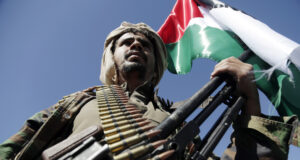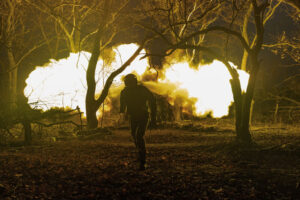The collapse of Assad’s regime in Syria has not changed the balance of power in the war between Russia and Ukraine. There is no doubt that the Ukraine war, after the deaths of hundreds of thousands, will end through negotiations, much as it could have ended two years ago. The difference is that Ukraine will probably now lose not only Crimea, but also much of the Donbas region. Only increased, direct Western military intervention is likely to prevent that outcome, and doing so would pose significant risks.
By now it is obvious that Ukraine is not winning the war. Nato has provided many billions of dollars worth of sophisticated weapons to Ukraine including Patriot missiles, HIMARS and ATACMS missiles, Abrams tanks, F-16 aircraft, and now Storm Shadow missiles. None of this has produced a successful Ukrainian offensive. Instead, the conflict has become a war of attrition that relentlessly drains Ukrainian manpower and Nato arsenals. A nation of around 35 million people with a GDP of around $180 billion cannot hope to defeat a nation with a population of 150 million and a GDP of $2 trillion. The harsh reality is that Ukraine has as much of a chance of defeating Russia as Belgium would of defeating Germany, no matter how many Western weapons they receive.
The fall of Assad is not necessarily a sign of Russian weakness. In 2016, Russian air power, not ground forces, helped the Syrian army maintain control of the country. In 2024, a demoralised Syrian army dissolved without a fight. With Assad’s own army disbanding, there was little Russian air power could do to rescue him. At the moment, Russia’s two bases in Syria remain in Russian hands and their future is unclear. What is clear, however, is that Putin has kept his eyes on Ukraine, where Russian forces continue to take as much territory as possible before any potential negotiations begin.
Nor will economic sanctions change the war’s outcome. Beginning in 2022, Western nations imposed on Russia the most extensive sanctions regime seen since the Second World War. All in all, several thousand sanctions were placed on Russian individuals, businesses, and government institutions. This caused only a mild recession in 2022 which was quickly turned around. Instead of collapsing, the Russian economy has grown rapidly. Russia’s GDP grew by 3.6% in 2023, and is estimated to grow at the same rate this year. Ironically, the Russians have done better than those imposing the sanctions. In 2023, the US economy grew only by 2.5% while the German economy actually shrank, and the EU as a whole grew by less than 1%.
We should also remember that not losing the war is far more important to the Russian people and leadership than it is to Britain. Russians believe they are fighting a war for survival against a corrupt, godless, and implacable West. When Leopard tanks arrived in Ukraine, the headlines in Moscow read “German tanks again on Russian soil”. Every Russian parent who has lost a son to a German tank or a British missile is now demanding victory and revenge. What’s more, if Russia is defeated, President Vladimir Putin will not survive politically — the more Putin fears losing, the more he will escalate. If he falls from power, he will not be replaced by liberal democrats, but by even more hard-line Russian nationalists.
The justifications for Britain supporting Ukraine have always been questionable, but very seldom questioned. Instead, a jingoist media has consistently understated the risks involved while encouraging support for the war based upon three assumptions: Russia’s invasion was unprovoked; Ukraine is a democratic, long-unified nation worth defending; and Ukraine can win the war. Each of these assumptions is badly flawed.
The truth is, Russia was provoked. Why, Russian leaders ask, does a purely defensive alliance need to expand its membership? What is wrong with formal Ukrainian neutrality similar to that provided by the Austrian State Treaty of 1955? Why was Nato giving Ukraine a wide range of weapons, training, and intelligence long before the Russian invasion?
Ukraine in Nato would mean the US Navy in Sevastopol and American missiles 300 miles from Moscow. For a nation that has long based its security on trading space for time, that is a problem. Yet since the end of the Cold War, Nato has added 16 new members and moved 1,000 miles closer to Moscow and repeatedly voiced its willingness to welcome Ukraine as a new member. The logic of Moscow’s concern should be clear to anyone familiar with America’s own reaction to Soviet missiles in Cuba.
Russia’s leaders have repeatedly made their concerns clear. Twenty years ago, the American ambassador in Moscow advised the then secretary of state Condoleezza Rice that: “Ukrainian entry into Nato is the brightest of all red-lines for the Russian elite (not just President Vladimir Putin). In more than two-and-a-half years of conversations with key Russian players, from knuckle-draggers in the dark recesses of the Kremlin to Putin’s sharpest liberal critics, I have yet to find anyone who views Ukraine in Nato as anything but a direct challenge to Russian security.”
Western intelligence agencies warn us that if Putin is not stopped now, his next move could be to invade Western Europe. Might these be the same intelligence agencies who told us Saddam Hussein was building a nuclear bomb? Or who tell us daily how the poorly trained, ill-equipped and overstretched Russians will soon be defeated? In more than two years, the Russians have not managed to capture Kharkiv, much less Kyiv. The EU alone has three times the population of Russia, and 10 times the GDP. With the United States included, the military disparity between Nato and the Russian Federation becomes overwhelming in all but nuclear weapons. The idea that Putin plans to invade Europe is simply silly.
Then there is the question of whether Ukraine is worth defending. Ukraine is hardly a flourishing democracy. Rather it is a corrupt, one-party state, with extensive press censorship. Opposition parties have been suspended. Religious freedom has been restricted. Young men are forbidden to leave the country. Even before the war, the US Congress formally condemned Ukrainian nationalist groups such as the Azov Brigade as “white supremacist neo-Nazis”.
Nor is modern Ukraine a longstanding historic, geographic, or linguistic unit. The Russian-speaking eastern and southern regions were annexed to Ukraine by the Bolshevik leader Vladimir Lenin in 1922, specifically to make Ukraine less Ukrainian. The Soviet leader Nikita Khrushchev added the overwhelming ethnically Russian Crimea to Ukraine by administrative fiat only in 1954. Unlike Canada, which found ways to meld anglophone Protestants and francophone Catholics into one nation, Ukraine failed to embrace pluralism. Ukrainian nationalist governments in Kyiv rejected a federal model with autonomy for Russian-speaking regions. They rejected calls for adopting two official languages throughout the nation and went so far as to ban the use of Russian in administrative and commercial matters, even in predominantly Russian-speaking regions. As a result, many ethnic Russians and Russian speakers living in the country do not identify with Ukrainian nationalism and never have.
The recent deployment of Britain’s advanced Storm Shadow missiles in the Ukraine war represents a significant escalation in the provision of Western military aid to Kyiv. It has strengthened Britain’s commitment to Ukraine, but it has not slowed Russian’s grinding advance westward. More importantly, it has intensified Britain’s conflict with Russia. Moscow understands that unlike previous weapons delivered to Ukraine, Storm Shadows require direct foreign involvement in their targeting and guidance procedures. For some Russians, this means that Britain and Russia are already at war. The possibility of this situation spiralling out of control through miscalculation is what former Secretary of Defense Donald Rumsfeld would refer to as a “low-probability high-impact event”.
https://unherd.com/2023/08/how-mbs-wins-friends-and-influences-people/[/su_unherd_related]
Since the end of the Cold War, Russia has invested heavily in nuclear armaments; today, it possesses roughly 10% more warheads than the United States. Some of these can be mounted on hypersonic missiles against which there is no effective defence; others travel on unmanned submarines designed to swamp coastal cities with enormous radioactive tidal waves. The Russian Sarmat missile carries the equivalent of 600 Hiroshima bombs.
Such weapons have never been used, and their effect on populations and the climate are unknown. What is certain, however, is that a modern nuclear exchange would not resemble those of the Second World War. Comparing today’s nuclear weapons with the bombs dropped on Japan is like comparing a Mini with a Tesla. A single Sarmat could depopulate London and the home counties. Is there anything at stake for Britain in Ukraine to justify taking such an enormous risk?
Anyone truly concerned about the Ukrainian people should want this war to end as quickly as possible. The nation has already lost 20% of its territory. Nearly a third of its population has fled or been displaced. Thousands more have perished, and much of its infrastructure lies in ruins. The situation reminds one of Vietnam, where villages were burned in order to “save” them from the Communists. And yet the price of peace is affordable. It can be negotiated on the positive principles of Ukrainian neutrality, funding for reconstruction and self-determination for ethnic Russians.
This would be in Britain’s own interests too. Should the Exchequer be paying the pensions of Ukrainian civil servants when British pensioners have lost their fuel allowance? Moreover, history offers many examples of nations sleepwalking into wars that prove far more destructive than anticipated. Britain entered the First World War to defend Belgium and the Second World War to defend Poland. Launching Storm Shadow missiles to defend Ukraine will not defeat Russia, but it could well produce another confrontation far greater than initially foreseen. After successfully defusing the Cuban Missile Crisis, President John F. Kennedy warned against ever again forcing Russia to choose between national humiliation and nuclear war. We should heed his advice.
Disclaimer
Some of the posts we share are controversial and we do not necessarily agree with them in the whole extend. Sometimes we agree with the content or part of it but we do not agree with the narration or language. Nevertheless we find them somehow interesting, valuable and/or informative or we share them, because we strongly believe in freedom of speech, free press and journalism. We strongly encourage you to have a critical approach to all the content, do your own research and analysis to build your own opinion.
We would be glad to have your feedback.
Source: UnHerd Read the original article here: https://unherd.com/



